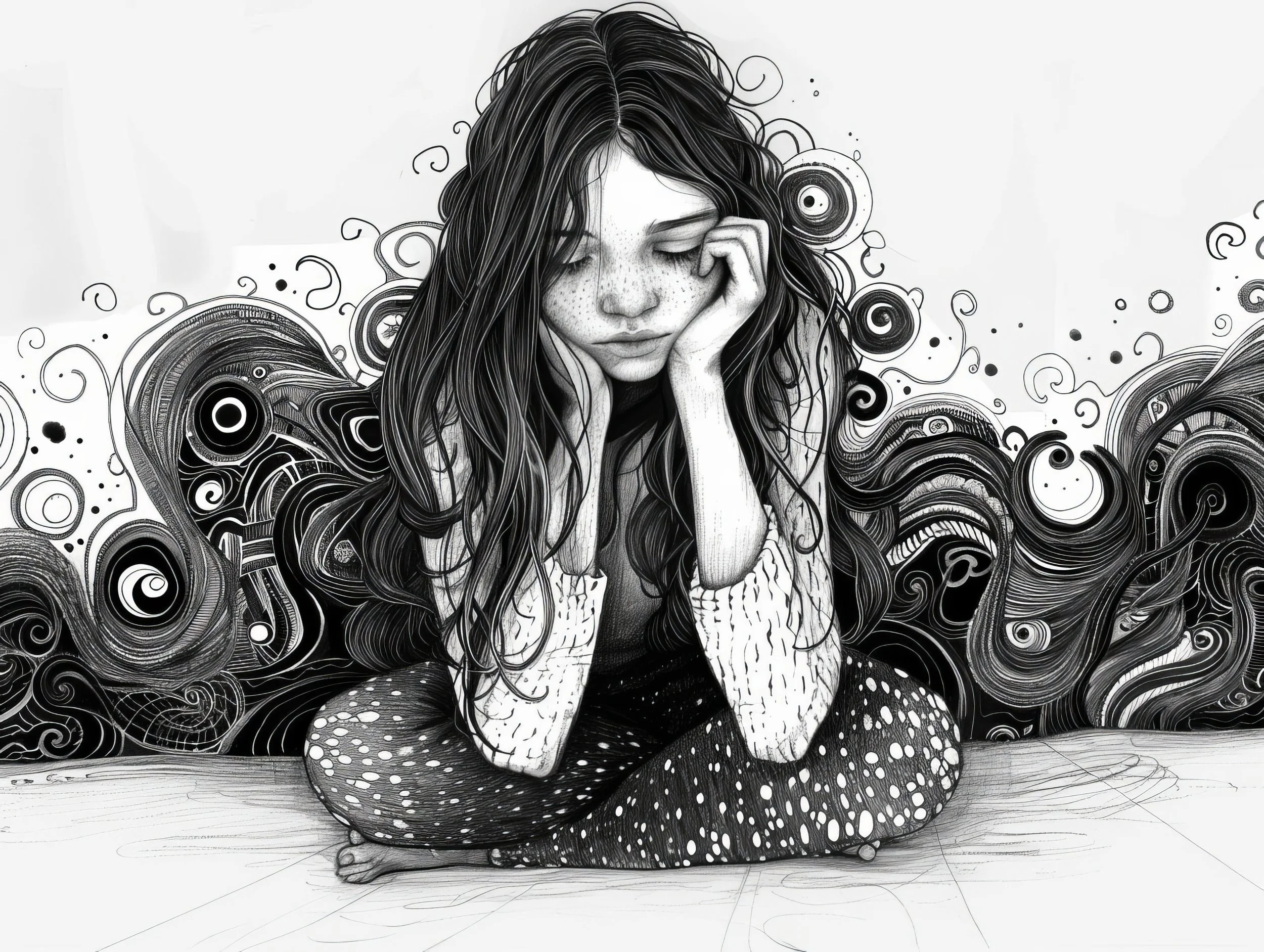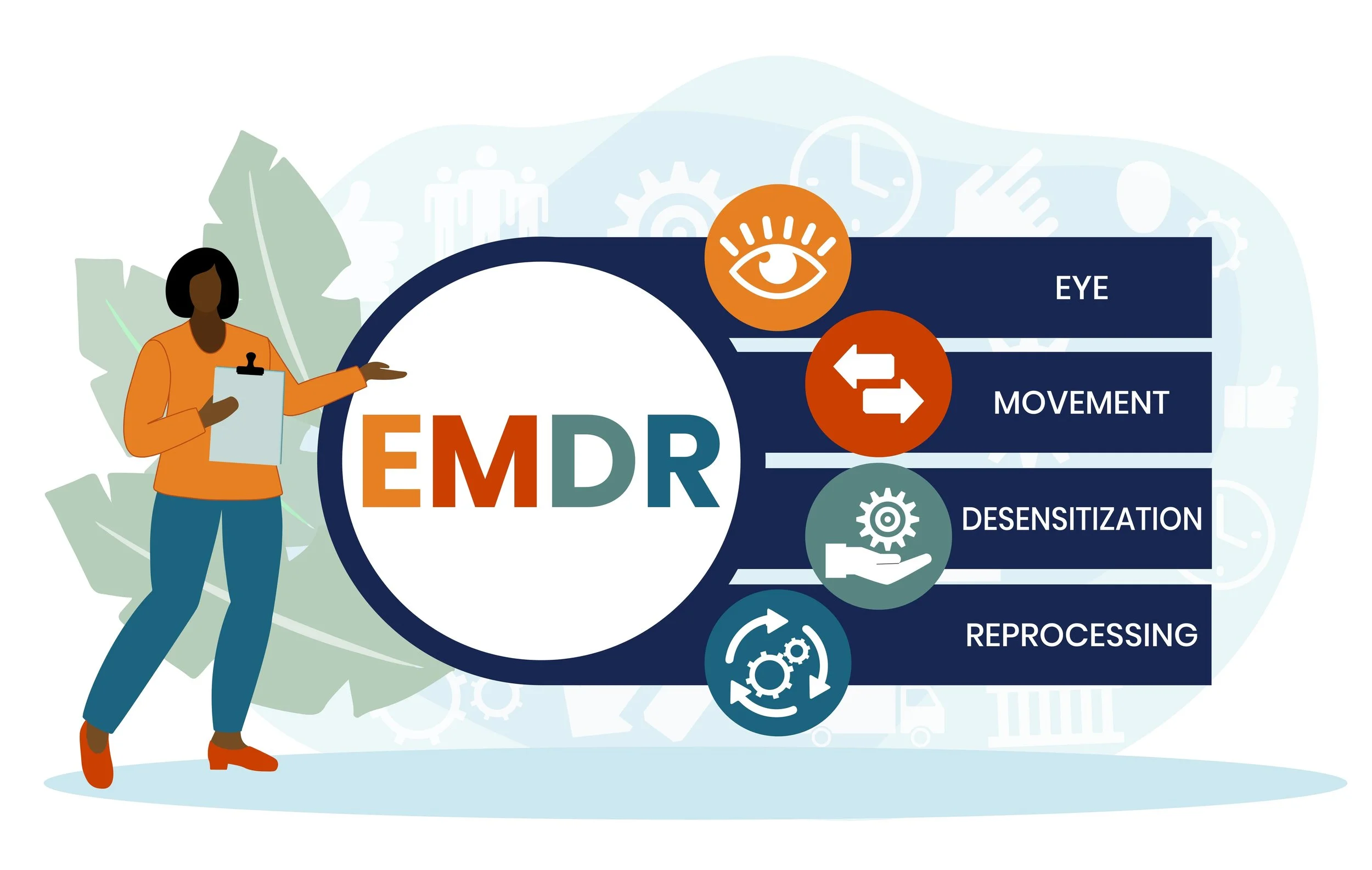EMDR Therapy For Midlife Women
In-person Therapy inAustin & The Rio Grande Valley.
Online Therapy in Dallas, Houston, & Across the State of Texas.
Is it all just getting too hard to hold together?
You keep replaying conversations from years ago, like they just happened yesterday.
A moment with your parent.
Something someone said that felt small at the time, but keeps echoing in the back of your mind.
A breakup. A betrayal. A look. A silence.
These memories pop up out of nowhere… and suddenly, you’re flooded.
Guilt. Overwhelm. Anxiety. Sometimes even terror.
It hits fast, and it hits deep.
And the hardest part? You can’t explain it (not even to yourself). It’s not always the kind of trauma you see on the nightly news.
Sometimes, it’s the quiet kind. The kind that reshapes your sense of self.
The kind that teaches you to question your worth, your safety, your right to take up space.
And even if no one else sees it—you feel it.
Every day.
Sometimes, the Hardest Wounds Come from What Didn’t Happened
Not all trauma is loud.
Sometimes it’s what didn’t happen that leaves the deepest wounds.
Maybe no one hit you.
Maybe your parents did the best they could.
Maybe you even understand why they were the way they were, because of their own trauma, their addictions, the pressure of being a sole parent.
But still...
You grew up feeling unseen, unheard, or feeling that love had to be earned.
You learned to anticipate moods, suppress needs, and stay small to stay safe.
And now, in midlife, you might find yourself caring for the very people who couldn’t care for you in the ways you needed.
It’s confusing. It’s re-triggering.
Healing Trauma Isn’t About Forgetting. It’s About Finally Feeling Free
Healing doesn’t mean forgetting.
It means you’re no longer stuck living in the past,on a constant loop.
You stop replaying conversations and experiences in your head like they just happened.
You walk into certain rooms, hear a certain voice, or smell something familiar—
and your body doesn’t go into panic mode.
You start to notice…
That you’re responding differently.
Not with defensiveness.
Not with resentment.
Not with the urge to shut down or run.
You stop reliving the pain in vivid detail.
And start recognizing:
That was then. This is now. I’m safe.
The old beliefs—
“I’m not enough.”
“I’m too much.”
“I don’t matter.”—
they loosen their grip.
They no longer shape your every interaction or steal your joy.
You may still be in relationship with the same people.
But you’re no longer trapped in the same patterns.
This is the hope.
To live fully in the present, without the past hijacking your peace.
EMDR Helps You Heal at the Root, Not Just Cope.
You don’t need more tools.
You need healing that reaches the root.
EMDR is different.
It helps your brain and body process painful experiences so they don’t keep hijacking your present.
You don’t have to talk about everything in detail.
You don’t have to relive it to release it.
You don’t have to explain.
Your system already knows how to heal, it just needs the right conditions.
EMDR helps you go there, but in a way that feels safe, supported, and in your control.
Together, we’ll work gently with your nervous system to shift the way old memories live in your body and mind.
You’ll still remember what happened.
But it won’t feel like it’s happening right now.
You’ll stop spiraling into shame, panic, or shut down.
You’ll feel more present, more calm, and more like you.
Not because you worked harder.
But because your system finally got what it needed to let go.
When the Past Loses Its Grip, You Get to Start Living in A Peaceful Place.
Healing doesn’t mean life gets perfect.
But it does mean your past doesn’t run the show anymore.
You stop bracing.
You stop spiraling.
You stop questioning your worth every time someone else is upset.
You start responding, rather than reacting.
You walk away from a hard conversation without replaying every word.
You feel something hard and… you stay with yourself.
Without shutting down.
Without losing yourself.
You begin to trust your instincts again.
You stop apologizing for having needs.
You speak more gently to yourself.
And little by little, you feel less like you’re disappearing beneath all the doing.
Midlife no longer feels like a slow unraveling.
It starts to feel like a homecoming.
You may still care for aging parents.
You may still juggle a career, a family, and a to-do list that never ends.
But you no longer feel like you’re running on fumes.
You feel calmer. Clearer. More grounded in who you are.
Not because everything around you changed,
but because you did.
What Can I Expect During EMDR Therapy?
Let’s take the mystery out of it.
EMDR isn’t just traditional talk therapy.
You don’t have to tell your whole story.
You don’t have to rehash every painful detail.
And there’s no homework or long exposure exercises.
We start by gently exploring the experiences that still feel stuck or unresolved for you. Then, when you're ready, we’ll identify one of those memories to focus on, and I’ll guide you through a process that helps your brain reprocess it.
You’ll be doing simple movements—like following a light back and forth, tapping on your chest, or holding small buzzers in each hand. It sounds a little unusual at first, but it’s actually very intuitive. And you’re always in control. If something feels like too much, we slow down. If you need a break, we pause.
Over time, the memory loses its emotional charge.
It no longer hijacks you.
And here's the beautiful part:
You get to install a new belief, like “I’m safe now” or “I’m in control”, to replace the old ones that trauma tried to tattoo on your mind.
Yes, EMDR is deep work. It can leave you feeling a little tired or foggy after a session, so I recommend scheduling sessions when you can rest afterwards. And yes, EMDR works beautifully online too (which means no stressful drive home).
We’ll start with a free consult to make sure it’s a good fit. If you’ve recently gone through something traumatic or have a more complex trauma history, we’ll talk about whether EMDR is the best next step—or if something else would serve you better.
Healing doesn’t mean erasing your story. It means the story no longer runs your life.
With EMDR, you may notice that:
You breathe easier, without the constant sense of dread.
You sleep more deeply and wake up without bracing for the day.
You respond instead of reacting, less defensiveness, less fight-or-flight.
You set boundaries without the guilt that used to eat at you.
Old memories may still surface, but they don’t hijack your whole body or your whole day.
The self-doubt and fear that once felt so loud start to quiet.
What Healing with EMDR Can Look Like
Healing doesn’t mean everything feels easy. It means the hard moments don’t control you anymore.
Healing shows up in the small, practical shifts that change everything:
You handle a tough conversation without replaying it on a loop afterward.
You walk into a place that used to trigger you, and your body actually stays calm.
You notice that your shoulders drop & your jaw unclenches.
You feel present with your partner, your kids, your friends, because your mind isn’t stuck in the past.
Healing doesn’t mean becoming someone new. It means finally feeling at home in yourself.
When your nervous system feels safer, everything else begins to shift:
Relationships feel less like battles and more like connections.
You respond with clarity instead of reacting out of fear.
You stop apologizing for having needs.
You find yourself laughing again, without forcing it.
You feel more energy for the things that matter most to you.
What If EMDR Doesn’t Work for Me?
The truth? EMDR is incredibly effective for most people… but nothing works for everyone. The good news is, you won’t have to wait months to find out. Usually within the first 1–2 sessions, we’ll both have a good sense of whether EMDR is helping you feel lighter, calmer, and more present.
If it’s not the right fit, that’s okay, we’ll explore other approaches together. There’s no “one right way” to heal, and my job isn’t to push you into a box. My job is to help you find what actually works for you.
And if you’re working through more complex, layered experiences (rather than one specific event), we’ll go in knowing it can take longer. That’s not a bad thing—it’s just how deep, sustainable healing works.
Will I Have to Relive Painful Memories?
You won’t have to give me every detail, and you definitely don’t have to tell your whole story. EMDR isn’t about retelling, it’s about reprocessing.
Yes, you’ll bring certain memories to mind, but you’ll mostly be noticing sensations, feelings, and thoughts as they come up. And as your brain processes the memory, those intense emotional “charges” start to fade.
You’ll still remember what happened, but it will no longer hit you like it’s happening all over again. You’ll be able to think about it without feeling like you’re right back in that moment.
What If I Get Overwhelmed?
We don’t dive straight into the hard stuff. Before we ever touch a painful memory, you’ll learn techniques to ground yourself, calm your body, and create a sense of safety.
If you ever start to feel overwhelmed during a session, we’ll pause. You’ll have a “stop” signal you can use anytime, and I’ll guide you through one of your safety tools so you can come back to calm.
At the end of a session, we’ll “put away” the memory in a mental container so it’s not spilling into the rest of your day. You’re never left alone in the middle of something hard. Your comfort, safety, and sense of control always come first.
If You’re Wondering How EMDR Works (or If It Will Work for You)… You’re Not Alone
I want you to know:
Change is possible.
You’ve done enough just getting through the day. Enough surviving the week and pretending you’re fine.
Midlife doesn’t have to feel like holding it all together by a thread.
It can be the season where you finally feel steady, clear, and free.
When trauma isn’t running the show, healing opens up space for something new,
more peace, more presence, more possibility.
You don’t have to settle for “just getting by.”
It’s time to step into your second half of life with the freedom to actually live.
Ready to get started?






